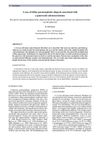 March 2021 in “Journal of Maxillofacial and Oral Surgery”
March 2021 in “Journal of Maxillofacial and Oral Surgery” Beard hair can be used for hair transplants in severe alopecia cases, with minimal complications and good results.
 January 2021 in “Clinical case studies and reports”
January 2021 in “Clinical case studies and reports” A man had nail and hair changes months after severe Covid-19, showing long-term effects.

Hair loss in young men in Central India is linked to severe heart disease.
 November 2020 in “Journal of The American Academy of Dermatology”
November 2020 in “Journal of The American Academy of Dermatology” Men with male pattern baldness may be more at risk for severe COVID-19, and anti-androgen treatments could offer protection.
November 2020 in “Case reports in endocrinology” Removing one ovary helped treat a woman's severe PCOS symptoms when medicine didn't work.
 June 2020 in “Research Square (Research Square)”
June 2020 in “Research Square (Research Square)” Non-Kuwaitis with COVID-19 had higher chances of severe outcomes than Kuwaitis.
September 2019 in “Journal of Investigative Dermatology” IL-17 and certain immune cells are linked to more severe alopecia areata.
 May 2019 in “The Journal of Sexual Medicine”
May 2019 in “The Journal of Sexual Medicine” Drinking alcohol before taking flibanserin does not increase the risk of severe low blood pressure or fainting.
JAK inhibitors show promise in treating moderate to severe alopecia areata.
February 2017 in “DOAJ (DOAJ: Directory of Open Access Journals)” Botulinum toxin type A did not help regrow hair in severe alopecia cases.
 April 2016 in “Journal of The American Academy of Dermatology”
April 2016 in “Journal of The American Academy of Dermatology” A child on life support experienced rapid hair loss due to severe illness affecting hair growth.
 February 2008 in “Vlaams dierengeneeskundig tijdschrift”
February 2008 in “Vlaams dierengeneeskundig tijdschrift” A cat's hair loss was linked to a severe pancreatic cancer.
September 1998 in “Journal of the European Academy of Dermatology and Venereology” PUVA-turban therapy can help some people with severe alopecia areata regrow hair.

Anti-androgens can help treat tough skin conditions like severe acne and excessive hair growth.
December 2022 in “The Aging Male” Lower 2D:4D ratio and older age increase the risk of severe hair loss in men.
October 2021 in “Journal of Investigative Dermatology” No significant link between male pattern baldness and severe Covid-19, but some shared biological pathways exist.
Greater concern about hair loss is linked to more severe hair loss and worse quality of life.
January 2019 in “Journal of Clinical Dermatology” The hair tonic improved hair growth and thickness without severe side effects.
July 2016 in “International journal of biomedical research” Family history and elevated DHEA-S levels are linked to more severe hair loss.
 January 2016 in “American Journal of Clinical and Experimental Medicine”
January 2016 in “American Journal of Clinical and Experimental Medicine” Lower zinc levels in hair are linked to more severe male pattern baldness, but blood zinc levels don't show this link. Age also increases baldness severity.
 147 citations,
June 2011 in “New England journal of medicine/The New England journal of medicine”
147 citations,
June 2011 in “New England journal of medicine/The New England journal of medicine” 5α-reductase inhibitors may prevent prostate cancer but could also raise the risk of more severe cancers.
 134 citations,
September 2008 in “Lasers in surgery and medicine”
134 citations,
September 2008 in “Lasers in surgery and medicine” Low fluence photoepilation temporarily removes hair by targeting the hair follicle's pigmented area without severe damage.
 119 citations,
May 2020 in “Journal of The American Academy of Dermatology”
119 citations,
May 2020 in “Journal of The American Academy of Dermatology” Most COVID-19 patients in hospitals have androgenetic alopecia, more in men, suggesting a link between androgen sensitivity and severe COVID-19 symptoms.
100 citations,
July 2006 in “British Journal of Dermatology” Triamcinolone acetonide injections help hair regrow quickly in mild alopecia but not in severe cases.
97 citations,
January 1996 in “Clinical infectious diseases/Clinical infectious diseases (Online. University of Chicago. Press)” Fluconazole is somewhat effective for skin-related sporotrichosis but less so for severe forms, and should be a backup treatment.
 50 citations,
February 2007 in “Clinical obstetrics and gynecology”
50 citations,
February 2007 in “Clinical obstetrics and gynecology” Early detection and treatment of PCOS in teenagers is important to manage symptoms and prevent severe issues.
46 citations,
June 1990 in “Archives of dermatology” Combining 5% minoxidil and 0.5% anthralin can help regrow hair in some severe alopecia areata patients.
37 citations,
October 2017 in “Advanced drug delivery reviews” The review suggests that there are various treatments to help restore skin color after severe burns.
 31 citations,
June 2015 in “British Journal of Dermatology”
31 citations,
June 2015 in “British Journal of Dermatology” Hormonal treatments are effective as a second-line option for moderate-to-severe acne in females, but should be used with caution due to health risks.
 31 citations,
October 2013 in “Psychosomatics”
31 citations,
October 2013 in “Psychosomatics” Psychotropic medications can cause skin reactions, including severe conditions like SJS and TEN, and it's important for psychiatrists to recognize and manage these side effects.
















